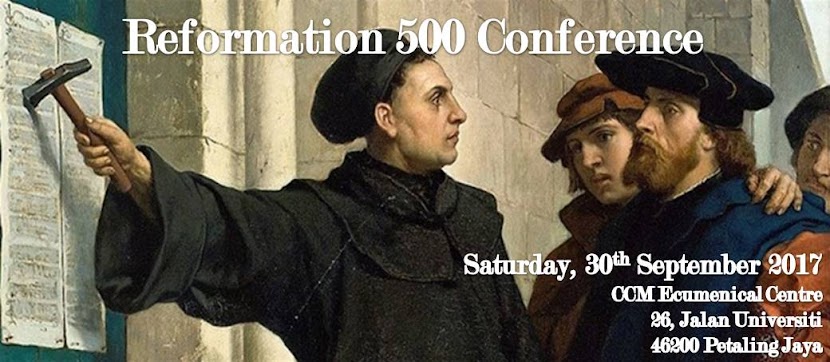Some while back,
the speakers and facilitators were invited to respond to a questionnaire that
aimed to distil from them how their own personal encounter with the Reformation
had impacted their life and ministry. Here we share the responses of two of our
workshop facilitators at the forthcoming Reformation 500 Conference 2017: (1)
Lim Sian Pheng (The Dawn of the Reformation) and (2) Augustin Muthusami (Luther
and the Reformation). We trust that what they have to share will be an
encouragement to you to seriously take a plunge into understanding the
Reformation more fully.
LIM SIAN PHENG
1. When did you first become aware of the Reformation?
I was baptized on
Reformation Sunday. The church celebrated Reformation Sunday as it was a
Lutheran Church.
2. What was it about the Reformation which caught your
attention then?
I have always like
history and the Reformation is such momentous historical event. It alters the
entire religious and political landscape of Western Europe.
3. Since then, have you read about the Reformation? If
so, what books have been most helpful?
Carl Trueman’s Reformation: Yesterday, Today and Tomorrow
is particular helpful in answering the question why do we need to bother with
something that happened in the 16th century. I like how he define
the Reformation as a move to place God as he has revealed himself in Christ at
the centre of the church’s life and thought.
4. How has the Reformation impacted your life and your
ministry?
Its God-centred
and Christ-centred theology has helped me in my own theologizing. The
rediscovery of the gospel by the Reformers has made me more appreciative of
God’s amazing grace.
5. One of the joys for the organiser of this
conference has been that you, as a speaker or facilitator, so readily agreed to
participate in it. Was there a reason for that enthusiasm?
I have always
believed that if we don’t know our roots and are not anchored on them, we will
drift along aimlessly and dangerously. I think the topics covered in the
conference can hopefully excite the people to want to know more about the
richness of their heritage and how it can help them to live as Christians.
6. What would you wish participants to take away from the
conference?
Please see part of
the answer to Question 5.
AUGUSTIN
MUTHUSAMI
1. When did you first become aware of the Reformation?
Very young,
probably during Catechism class – maybe I was 13 or 14
2. What was it about the Reformation which caught your
attention then?
Back then not
much. Basically all I knew was that a man called Luther kicked up a fuss over
how we are saved (in a nutshell!)
3. Since then, have you read about the Reformation? If
so, what books have been most helpful?
As a Lutheran Pastor
and as someone who regular teaches on church history (among other topics) to
lay people, I have read very widely on the Reformation and the most important
aspects of it. It’s hard to say which particular books have been helpful, but I
like Luther’s writings, particularly on the reform of the mass, which to me, is
the most practical aspect of the Reformation.
4. How has the Reformation impacted your life and your
ministry?
In terms of
theological thought that has guided me: Grace – both for me and for those
around me. To move away from legalistic thinking and embracing grace as a
philosophy of life.
5. One of the joys for the organiser of this
conference has been that you, as a speaker or facilitator, so readily agreed to
participate in it. Was there a reason for that enthusiasm?
I suppose, just to
share my thoughts or my take on the whole subject.
6. What would you wish participants to take away from
the conference?
How this is
actually relevant in a practical way in day to day living.
